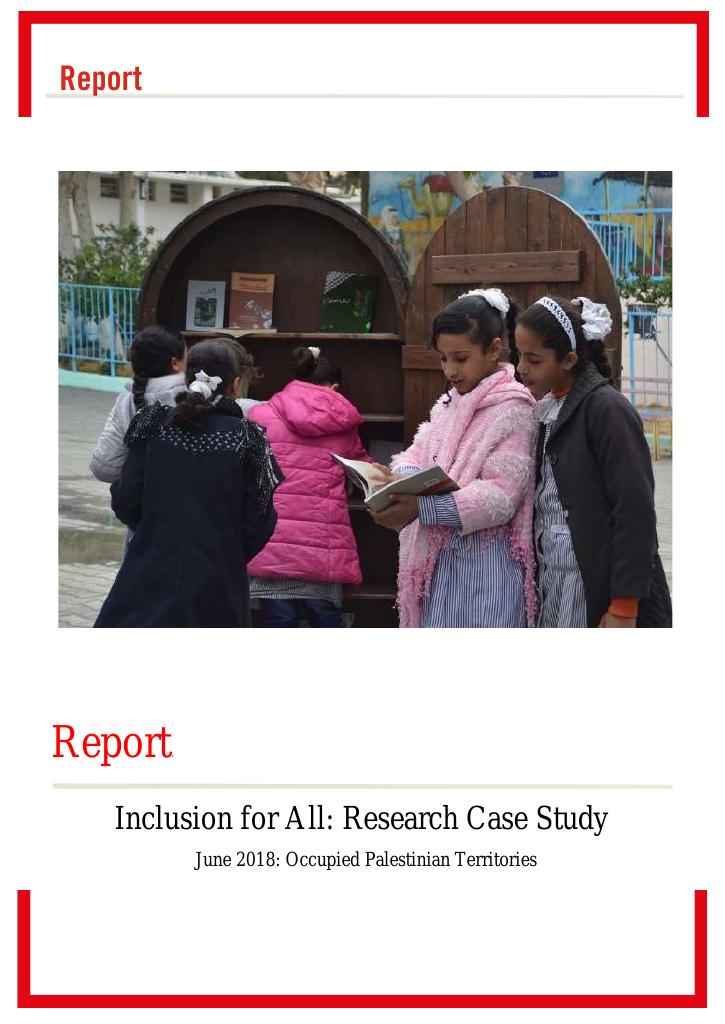Studie
Inclusion for All: Research Case Study
Background The Inclusion for All program, funded by Norad and implemented by Save the Children and its partners since 2015, seeks to increase the access of children with disabilities (CwD) to quality education and to strengthen child rights in the Occupied Palestinian Territories (OPT). Purpose/objective The review is intended for program implementers, donor, as well as target groups, as they seek to identify the most successful parts of the program and to design future programs. Methodology: The review was completed between February to May 2018, and utilizes previously-collected quantitative data, in addition to primary data collected from focus group discussions and interviews with key stakeholders, and observations of program activities. Key findings Academic improvements were not captured in the math and literacy (EGRA) exams among CwD in the West Bank. The Arabic exams did show improvement, however, meeting the midline target. Parents were enthusiastic about the parent awareness sessions, reporting that they helped them understand and support their children better. There was clear demand for the expansion of this program activity. The Palestine Children’s Council can be considered a key success of the program. Children elected to this council represented a diverse group of Palestinian children, and they made their voices heard among decision-makers Teacher training under the program succeeded in increasing the attainment of Quality Learning Environment (QLE) targets in the targeted schools, but teachers often felt that the training served more as a refresher course than training on new ideas. In addition, many teachers were eager to apply the skills from the training but reported having no CwD in their classes with whom they could apply them. The program’s student activities, such as HEART and other activities designed to promote the inclusion of all children, were popular with students with disabilities and without. CwD reported increased confidence in themselves, and teachers and parents reported reductions in child violence and other behavioural problems. Inclusion for All successfully worked with the Ministry of Education and higher Education (MoEHE) to develop a strategy and action plan based on the existing MoEHE Inclusive Education (IE) policy. Support to resource centers and resource rooms, through the provision of assistive devices and training for ministry officials, teachers, parents, and students was widely viewed as beneficial by all program participants. The complaints mechanism developed under the program in cooperation with the Ministry of Social Affairs functions well but requires more work to make teachers, parents, children, and the general public aware of its existence. The case management system (CMS) has been established and has entered 1600 cases of CwD to provide them with assistive devices and/or other services. The provision of devices, both for the CMS and for the resource centers/rooms listed above, needs continued funding to make it a sustainable activity that can be written into policy. The analysis of the Palestinian General Budget’s allocations for child services in the fields of health, education, social protection, disability, and recreation was utilized in the annual state Convention on the Rights of the Child (CRC) reporting process, and could become a valuable ongoing activity to support, as such analysis is not available elsewhere. Recommendations Below is a selection of the key recommendations Implement school-driven, school-wide needs assessment strategies to identify the strengths and weaknesses of each school – including physical infrastructure, resources, and human capacity - with regards to inclusive education, with a focus on CwD. Put structures in place that encourage school leadership to continue these inclusive education capacity-building strategies after the end of funded programming. To do this, the QLF needs to be seamlessly integrated into existing MoEHE and UNRWA frameworks for school and classroom environments; such integration requires close, daily cooperation with the MoEHE and UNRWA. Utilize resource rooms and resource centers in schools and communities for a variety of student activities, not only for CwD. Taking all students to resource rooms for school and community activities can reduce the visibility of CwD-specific activities taking place in those spaces and reduce stigma for CwD. Cooperate with the MoEHE and UNRWA to mainstream some of the program’s most effective extracurricular activities into existing MoEHE and UNRWA systems at schools themselves. Promote inclusion by expanding school-community initiatives in which CwD can participate alongside other children to showcase their strengths and role in the community at large. These initiatives could involve parents but should also target the larger community. Embed future teacher trainings within the relevant existing structures at the MoEHE and UNRWA. Wherever possible, teachers should be able to attend training as a part of their normal work day, and trainers should be consistent over the life of the program. Homework should be specific and tested in teachers’ current classrooms between training sessions. Training should also provide opportunities for reflection and feedback on the tasks they’ve tried in their real-life classrooms, such as classroom observation by their regular trainers. The first priority teachers for IE-related training should be teachers that have CwD in their schools and classrooms, and who are aware of identifications of these CwD. Collect longitudinal data on CwD achievement and motivation. Reducing stigma and promoting achievement requires long-term, large-scale samples unlikely to be possible with a small handful of participating schools. Invest in in-depth, long-term data collection; make use of the case management system for such research if and when possible. Continue to strengthen the work of the Palestine Children’s Council and the child-led monitoring groups by supporting the efforts of these initiatives - including utilizing a participatory approach in response to reporting mechanisms and complaints processes. In addition, consider expanding the opportunities for the Palestine Children’s Council to the pan-Arab and/or global arenas. Comments from the organisation Save the Children Norway has developed a management response and action plan based on the recommendations of the review.
